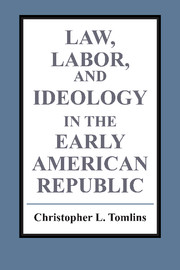Book contents
- Frontmatter
- Contents
- Preface and acknowledgments
- Prologue: two moments of the republic
- PART 1 LAW AND THE FACTS OF AMERICAN LIFE
- PART 2 LAW, LABOR, AND STATE
- Introduction: dictates of wise policy
- 4 Combination and conspiracy
- 5 The American conspiracy cases
- 6 Commonwealth against Hunt
- PART 3 LAW, AUTHORITY, AND THE EMPLOYMENT RELATIONSHIP
- An interlude: on law and economy
- PART 4 THE NEW INDUSTRIAL ORDER
- Epilogue: “free Ameriky”
- Index
Introduction: dictates of wise policy
Published online by Cambridge University Press: 05 August 2012
- Frontmatter
- Contents
- Preface and acknowledgments
- Prologue: two moments of the republic
- PART 1 LAW AND THE FACTS OF AMERICAN LIFE
- PART 2 LAW, LABOR, AND STATE
- Introduction: dictates of wise policy
- 4 Combination and conspiracy
- 5 The American conspiracy cases
- 6 Commonwealth against Hunt
- PART 3 LAW, AUTHORITY, AND THE EMPLOYMENT RELATIONSHIP
- An interlude: on law and economy
- PART 4 THE NEW INDUSTRIAL ORDER
- Epilogue: “free Ameriky”
- Index
Summary
In November 1806, the Monthly Anthology and Boston Review, a newly established Bostonian literary miscellany, published a short review of a pamphlet recounting “The Trial of the Journeymen Boot and Shoemakers of Philadelphia.” The pamphlet had appeared in May of that year in the wake of the journeymen's indictment and conviction on a charge of a combination and conspiracy to raise their wages. According to Thomas Lloyd, one of the pamphlet's publishers and the original transcriber of the court proceedings, the issues involved had made the trial “the most interesting law case which has occurred in this state since our revolution.” Certainly the result had excited much controversy and had led to pressure on the governor and General Assembly of Pennsylvania for legislation to curb the courts' assumption of authority to convict combining workmen of common law conspiracy. “Hitherto we have travelled on the happy and level road of rational and equal justice,” the editor of the staunchly Jeffersonian Philadelphia Aurora, William Duane, had written following the journeymen's indictment. “The barbarous principles of feudal subjection no where appear but in the deplorable curse entailed upon us by what has been called the ‘parent country’ – the slavery of the unfortunate Africans.”
- Type
- Chapter
- Information
- Law, Labor, and Ideology in the Early American Republic , pp. 101 - 106Publisher: Cambridge University PressPrint publication year: 1993



